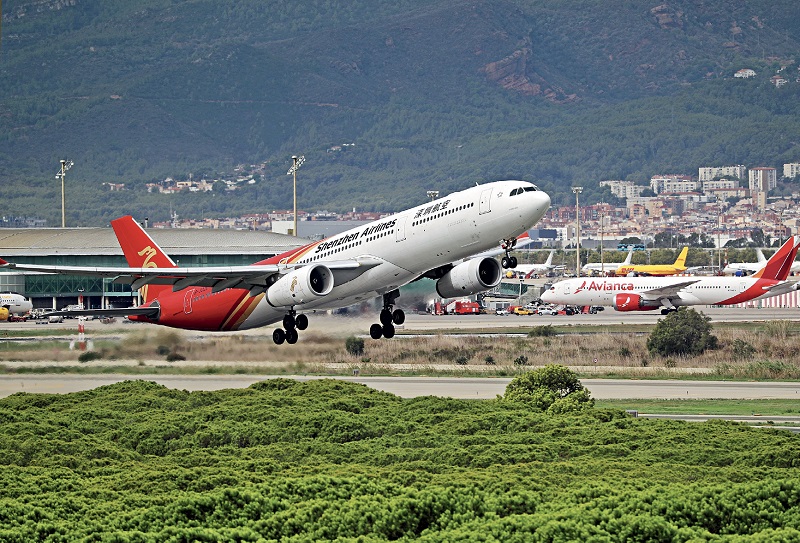On August 28 China’s Shenzhen Airlines inaugurated a new direct route from the industrial hub of Shenzhen in southeast China to Spain’s second largest city Barcelona, Europe’s eighth busiest container port and one of the EU’s most cosmopolitan maritime cities. The new route between these two cities, which became sister cities in 2021, coincides with China-Spain diplomatic relations celebrating 50 years in 2023.
Close on the heels of this, Shenzhen-headquartered Chinese telecom giant Huawei launched its new top-of-the-line smartphone Mate 60 Pro in what New York-based investment firm Jefferies called a “big tech breakthrough for China.” One reason for the attention the phone is drawing is that it uses a chip developed by China’s largest contract chipmaker SMIC, a landmark development in view of the Biden administration’s attempts to ban Chinese companies from accessing Western key technology. Canada-based technology research firm TechInsights said it “demonstrates the technical progress China’s semiconductor industry has been able to make.”
The air route and hi-tech advancement both mean a lot. With the Belt and Road Initiative bringing unprecedented investments in railways, highways, submarine cables, communication technology and new air routes, maps of new global landscapes in different fields are coming into being.

A Shenzhen Airlines aircraft takes off from the Barcelona airport on September 4, 2023. The Chinese airline started direct flights between Shenzhen and Barcelona, Spain, on August 28, 2023.
A Changing World
While Europe has 30-odd cities boasting a population of over one million, China has over 106 such cities. Over the past several decades, China has built infrastructure at an unpredecented speed in world history and the results are astonishing.
Barcelona’s mayor Jaume Collboni said with the new route, “a new channel of opportunities” has been opened. We should bear in mind that last November, Spain cemented its position as the country with the longest high-speed rail network in Europe, with 3,100 kilometers of track and 1,800 kilometers under construction. It is second only to China, which has the world’s largest high-speed rail network. Since 2007, China has been building high-speed rail at an extraordinary pace with the total operation length reaching 42,000 km with another 2,500 kilometres under construction by the end of 2022. So, the Shenzhen-Barcelona flight connects passengers to the two most modern and fastest transportation networks in the world.
Collboni also highlighted the collaboration between the two cities and their people-to-people bond and cultural interest. Barcelona epitomizes emotion. Its authorities said, “Talent is the new oil, but emotions are the energy that moves us.” This is also applicable to Huawei, founded by the pioneering Ren Zhengfei in a fishing village 40 years ago, and then becoming a global leader in telecommunication.
Barcelona hosts the annual Mobile World Congress, described as the largest and most influential connectivity event in the world. At the 2023 edition of the event held in February-March, Huawei was a participant, joining the discussion on the future of the latest evolution in 5G technology.
Huawei has several Spanish connections. Last year, it and the Hospital Clínic de Barcelona signed a memorandum of understanding on using technology in healthcare. It means Huawei is providing telecom equipment and technological solutions based on AI and 5G to reinforce the digitization of Spain’s health system. That is helping, for example, in early detection of diseases and improving medical care as well as exploring new forms of interactions, including remote connection treatment and patient monitoring.
The concepts of innovation and compassion, inherent in medicine, with remoteness turned into vicinity, are changing maps. And the benefits are for all. Since Barcelona has a vibrant Chinese community and many other nationalities, Chinese and other patients are benefiting too.
In November 2021, then Mayor of Barcelona, Ada Colau, and the Mayor of Shenzhen, Qin Weizhong, signed a twinning agreement between the two cities that promotes collaboration in trade and investment, biotechnology, information technology, environmental sustainability, and renewable energy.
In economic matters, Barcelona is a member of the World Innovative Cities Cooperation Organization, which is led by Shenzhen and includes 28 member cities and 52 member organizations around the world. The platform promotes international cooperation on innovation and seeks to lead innovation-driven urban economic development, social progress, and improvement of people’s livelihood.

Visitors are engrossed in the immersive exhibition “Seasonal Proximities,” at the Espacio Cultural Serrería Belga, on August 5, 2023, in Madrid, Spain. The event celebrates the 50th anniversary of China-Spain diplomatic relations.
Sustainable Mobility
In early September, the Spain-based China-Europe Association for the Promotion of Mutual and Sustainable Trust (EU-China Trust) hosted an official visit by senior officials from Hefei, the city in east China that leads in electric car manufacturing. The delegation visited Madrid, Salamanca and Barcelona. The “China and Spain, Striving Together Towards Sustainable Mobility” event was held during their visit to bring different key organizations, public administrations and private sector stakeholders together to promote cooperation in sustainable policies.
This kind of cooperation between Hefei and Spanish cities goes back to 2021, when the EU-China Trust organized a forum to promote EU-China cooperation on climate change in the representative office of the European Commission in Madrid despite the COVID-19 pandemic.
The Belt and Road Initiative has contributed to transforming the concept of an “international community” which until recently meant a handful of countries in the Northern Hemisphere. It offers developed countries greater interconnectivity and gives the Global South interconnectivity plus broader development opportunities and choices.
The world map we learned in school is becoming obsolete and we need to reimagine it. 
AUGUSTO SOTO is director of the Spain-based Dialogue with China Project.